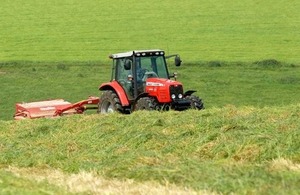UK votes on Common Agricultural Policy reform
The UK Environment Secretary has pressed for a reformed Common Agricultural Policy to benefit British farmers, the environment and taxpayers.

Red tractor in field of green.
The system that spends €4 billion of tax payers’ money each year to support the UK farming industry, has been under review in Luxembourg.
With a final deal yet to be struck, the UK has supported a mandate for the Irish Presidency to take the revised CAP proposals to Brussels to be passed by the full European Parliament.
Environment Secretary Owen Paterson said:
Negotiations between 27 agriculture ministers, the EU commission and the European Parliament were never going to be easy. We all have different ambitions for CAP reform and the Irish Presidency has had a really tough job trying to get a deal. Simon Coveney must be warmly congratulated for all his work so far.
We want to get the best possible reform for our farmers, taxpayers and consumers whilst delivering a better outcome for the environment.
In negotiations so far, the UK has succeeded in blocking a host of regressive proposals that would have meant a very bad deal for British farmers and tax payers.
In explaining why he rejected one of the four CAP regulations the Environment Secretary said:
Some Member States have been pressing to take CAP back to the dark days of butter mountains and wine lakes, with costly interventions in the market. I have resisted this every step of the way. That’s why Germany and the UK were unable to support one of the regulations which manages the EU food and agriculture market.
All along I have rejected moves that would increase costs for hard pressed consumers. British shoppers should not have to pay twice for the CAP - once through their taxes and again at the supermarket tills.
In response to pressure from the UK, significant progress has been made to improve measures for the UK sugar industry, but not enough. Mr Paterson said:
Sugar quotas are bad for business and bad for consumers, driving up the wholesale price of sugar by 35% and adding 1% on our food bills. We have battled successfully and secured an agreement that beet quotas will end in 2017, despite the efforts of many to push this back to 2020. The case for better access to cane sugar is still being negotiated thanks to our efforts.
In accepting the other three regulations, the UK has been able to build on progress made back in March. There is now absolute clarity from the Commission that each of the four parts of the UK can implement CAP as they see fit.
The Environment Secretary said:
Farmers in England, Northern Ireland, Scotland and Wales can be reassured that their governments have the complete freedom to deliver a CAP tailored to their needs and circumstances.
This successful outcome is a result of working as a united force with all Devolved Administrations and respecting regional farming priorities. I am pleased we have been able to agree changes needed for all four countries.
Further gains have been made to secure flexibility on greening measures to benefit the environment and UK farming. Mr Paterson said:
We fought hard to secure the freedom to green direct payments in a way that reflects our national circumstances. UK Governments can now transfer extra funds to their rural development budgets which represents the best use of public money whilst delivering the best environmental outcomes.
However there are disappointments. Despite the UK making good progress to decouple payments - the allocation of CAP subsidies linked to production - many Member States continue to make coupled payments at a high level. Mr Paterson said:
It’s disappointing that the European Commission wants farmers’ dependency on subsidies to continue. Not only do they create market distortions, they are a poor use of tax payers’ money and discourage trading in a competitive open market. Member States, including the UK, will be allowed to pay up to 8% of their direct payment budget as coupled payments. Remaining Member States will be allowed up to 13%.
I hope the negotiations will be completed today in Brussels, providing much needed certainty and clarity for farmers.
Updates to this page
-
Clarified a reference to sugar quotas
-
First published.